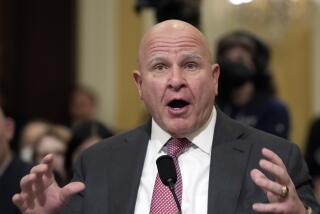Give Embargo Time to Work, Bush Is Urged
- Share via
WASHINGTON — Three former high-ranking American diplomats Monday urged President Bush to show patience in the Persian Gulf crisis and give the economic embargo of Iraq much more time to work before moving to a military solution.
Using force soon could inflict lasting damage on U.S. strategic interests in the region, warned Richard W. Murphy, an assistant secretary of state in the Reagan Administration, and George W. Ball, undersecretary of state in the Kennedy Administration
“We can outlast him,” said Paul H. Nitze, retired arms control adviser, referring to Iraqi leader Saddam Hussein.
The statements were made at a Capitol Hill forum sponsored by the Federation of American Scientists on the eve of separate Senate and House hearings on Bush’s recent decision to double the number of U.S. troops in the gulf region.
Leading Democrats are expected to use the hearings to push more assertively for allowing an extended period for economic sanctions to work and for diplomatic pressure to erode Hussein’s stand in Kuwait, which Iraq invaded Aug. 2.
At the same time, however, the Bush Administration is working to obtain a new U.N. resolution on use of force in the Persian Gulf that could pave the way for offensive military action in January.
Murphy said he believes the coalition of moderate Arab states backing the United States would prefer “a very hard squeeze” on Iraq rather than a U.S. attack in the next several months.
However, another participant in the forum, former Marine Lt. Gen. Bernard Trainor, said it appears to him that the President has decided to take the military option. “I don’t believe he (Bush) is bluffing. I think he’s going straight at Saddam Hussein. . . . I believe he’s written off the embargo.”
Harold H. Saunders, an assistant secretary of state under both Presidents Gerald R. Ford and Jimmy Carter, said the President needs more advice on political options in the gulf crisis.
“I wish that somebody in the U.S. government was giving one-tenth of 1% of the time in writing the political scenario that they have in giving him the military options,” Saunders said.
The speakers agreed that a unilateral offensive would have extremely damaging consequences.
“We’d be in dreadful trouble internationally as well as domestically, and it would be a disaster for him,” said Nitze, predicting longstanding Arab animosity against the United States.
He said the United States should reduce its troop strength in Saudi Arabia and prepare to wait two or three years, if necessary, for the U.N.-imposed sanctions to strangle the Iraqi economy.
Ball, agreeing with Nitze, said Bush will find public support for his policy disappearing if it risks tens of thousands of American lives.
“The reason the President has enjoyed high popularity ratings was because he was talking about defense and deterrence,” Ball said. “If we actually do get into a war, they (Bush’s poll ratings) would go to hell in a hurry.”
Murphy said he believes that Bush “burned his bridges” by ordering a sharp increase in U.S. forces in the gulf and declaring that they would not be replaced or rotated home until the crisis is resolved.
More to Read
Sign up for Essential California
The most important California stories and recommendations in your inbox every morning.
You may occasionally receive promotional content from the Los Angeles Times.













